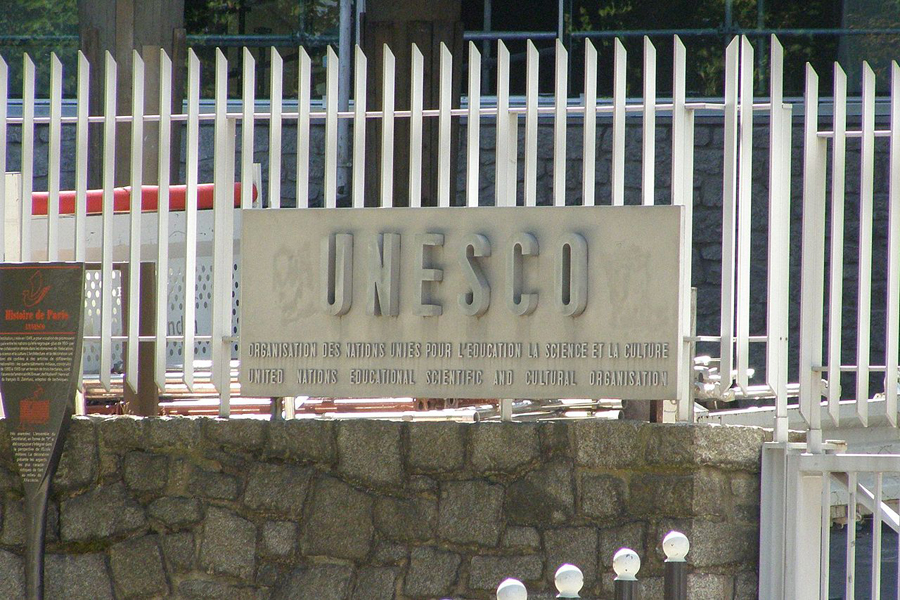A Seat at the Table
On Donald Trump’s decision to withdraw the US from UNESCO
On Donald Trump’s decision to withdraw the US from UNESCO

Let’s be clear, Donald Trump’s decision to remove the USA from the United Nations Educational, Scientific and Cultural Organisation (UNESCO) was not solely informed by what he perceives to be a ‘continued anti-Israel bias’. There are, as always, numerous factors to consider, and yes, one of them is Trump’s burgeoning relationship with Benjamin Netanyahu, who in 2016 condemned UNESCO’s decision to designate the ancient city of Hebron in the West Bank a Palestinian World Heritage site (a ruling that implicitly acknowledged the destructive results of Israeli occupation) as a ‘surreal’ and ‘absurd’ act of anti-Semitism. He quickly footnoted his comments in a joyously proto-Trump tweet: ‘What's next? A UNESCO decision denying the connection between peanut butter and jelly? Batman and Robin? Rock and roll?’ Naftali Bennett, Netanyahu’s education minister, promptly announced that Israel’s membership would be discontinued.
A more pressing concern may have been economically formed. At the time that US secretary of state Rex Tillerson (who on 20 July 2017 referred to Trump as a ‘fucking moron’, thereby committing the political cardinal sin of honesty) informed Irina Bokova, the director-general of UNESCO, of the planned withdrawal, the US owed an excess of USD$500m in arrears to the organization, having already had its voting rights revoked – although not its seat on the Executive Committee. (The US lost its voting privileges in 2013, having refused to pay into the organization since 2011 in protest against the induction of Palestine as a full member. Israel suspended its dues at the same time, and also lost voting privileges two years later.) The US was withdrawn from UNESCO once before, in 1984, by the Reagan administration. Arguably, that was also a response to mounting economic pressure: at the time, UNESCO was giving a greater platform to discussions surrounding the so-called New International Economic Order, an initiative dictating that wealthy countries offer sizeable resource packages to poorer ones, and had requested an annual budget increase of close to 10 percent. But Reagan similarly justified his decision with accusations of politicization and institutional bias – back then it was a perceived pro-Soviet Union agenda on the part of UNESCO.

Removing political ideology and base economics from the picture, we are left with something all the more troubling: a president who has cancelled the USA’s UNESCO membership because he does not care, and because he can. UNESCO represented an easy target, one that Jonathan Marcus notes ‘is a multilateral body with educational and developmental goals like promoting sex education, literacy and equality for women’, and it therefore fell victim to this train of thought: ‘It does not directly affect me. I do not reap the benefits. So why should it take up my time?’ As was tweeted by Pramila Jayapal, US Representative for Washington State's 7th congressional district, the president has made it clear that ‘culture, history, world heritage isn’t important to him, even if it is to Americans & world.’ Take that logic of malignant narcissism and apply it to Puerto Rico, Harvey Weinstein, the Iran nuclear deal, Mexico, gun control, climate change, Obamacare, Charlottesville, and a distressing pattern emerges.
It is no secret that while UNESCO existed as the bellwether authority on world culture in its heyday (throughout the 1960s and ’70s), it is currently experiencing something of an identity crisis. In a 2014 article for the New Left Review, Marco D’Eramo attempts to coin the ungainly phrase ‘UNESCO-cide’. For Domus, he expands on the neologism with venom: ‘Its touch is lethal: wherever the UNESCO hallmark is applied to a city, the city dies out, becoming the stuff of taxidermy.’ Hyperbole aside, D’Eramo has a point. Laignee Barron, reporting for the Guardian in August of this year, hones in on Luang Prabang, the ancient capital of Luang Prabang Province in northern Laos, a world heritage town of around 50,000 people that now anticipates an overwhelming influx of more than 700,000 tourists by 2018. In the same article, Barron speaks with a local property manager by the name of Chew Siew Pheng, who presides over a homestay on the outskirts on Penang Island, Malaysia, which was sentenced to UNESCO status in 2008. Unless the commercialization of the region is brought under control, Siew Pheng warns, ‘the identity, the history of this place will be gone’. She continues: ‘Only we can preserve this place.’

Add to this growing malcontent the barbarism inflicted upon various UNESCO world heritage sites in the Middle East in the past few years (Palmyra's Temple of Bel, to name but a fragment of a growing pile of rubble), the trade in illegal antiquities that has ensued, and the belief that the body has bestowed heritage status upon too many locales across the past 5 years or so, thus spreading its resources too sparingly, then we can agree that we have hit a rough patch. But in spite of these navigable shortcomings, UNESCO’s mission statement remains staunch, hopeful, necessary: to ‘build peace in the minds of men and women’; to ‘create the conditions for dialogue among civilisations, cultures and peoples, based upon respect for commonly shared values’. It is also a mission statement that continues to be rolled out with perhaps unparalleled heft. Between January and June of this year, UNESCO spent USD$90,913,570 on education, while USD$41,662,146 went to culture and USD$33,998,890 was pushed towards the natural sciences around the globe. It is also important to note that the country that received the most funding across that same period was Brazil (USD$13,015,588), followed by Afghanistan (USD$11,404,879), Iraq (USD$ 5,323,607) and Jordan (USD$3,838,695). (UNESCO’s ‘Transparency Portal’ provides a comprehensive overview of the organization’s global activities and project, as well as a detailed map of financial flow.)
Conversation is important – indeed, vital – both within the realm of ‘culture’ and without. It is also, more often than not, difficult. It is burdensome, frustrating, exhausting, pedantic, dominating, deceiving, and rarely does it concern itself with resolution – not least in a supra-national organization of close to 100 full-time members. But it is only via a working through of such unavoidable complexities that we will ever be able to coax a global discussion, and our communal fates in relation to it, towards a better place. To quote Sonia Boyce: ‘Let frustration fuel inspiration’.

And herein lies the problem. Trump is pulling the USA out of a project that is languishing in its dedication to an ambitious undertaking – namely, the preservation of cultures past to improve potential futures. In so doing, Trump has disclosed the fact that, when it comes to uncomfortable issues, those which require the US to exist as an equal amongst others, he is not willing to engage. Some ungodly twist of fate has left him with a seat at the table and, not for the first time, he is choosing not to sit. If we have found ourselves at a point at which leaving the room is preferable to fighting a corner (whichever fight, whichever corner), then we have a problem. We have an empty chamber where opinions remain unheard. We have disparate, divergent peoples and no bridge between them. We have a cultural dialogue that is no longer inclusive and unfettered, but is instead defined by singular, therefore parochial, perspectives.
Culture is a land of stories. It is a territory marked by shared expertise and weakness, commonality and conflict. When boundaries – physical or otherwise – spring up around us, it is the collective value that we bestow upon culture that allows us to surpass them and glean the numerous routes over, around and under, that may not have been visible before. If culture is not protected, these stories will not be told. If these stories are not told, then we will find ourselves greater estranged from one another than we have already become. And estrangement goes far wider than culture and the arts, and it burrows far deeper. To reiterate Irina Bokova’s response to Trump’s decision (which can, and should, be read in full here):
This is a loss to UNESCO.
This is a loss to the United Nations family.
This is a loss for multilateralism.
Main image: The UNESCO world heritage site of Palmyra, Syria, with the Fakhr-al-Din al-Ma'ani Castle, known as Palmyra citadel, in the background, March 4, 2017. Syrian troops backed by Russian jets completed the recapture of Palmyra from Islamic State, who had destroyed parts of the ancient site, on March 2, 2017. Courtesy: Louai Beshara/AFP/Getty Images





















